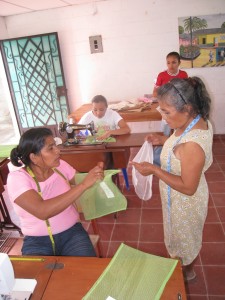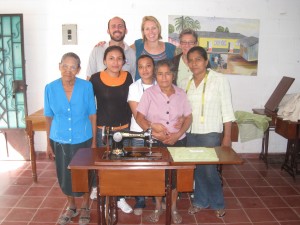
Erin Frisk is a doctoral student and researcher in the School of Sustainability. Her work focuses on K-12 sustainability education by incorporating behavioral theories into instruction. She is married to Aaron Redman, a School of Sustainability alumnus. In 2009, Frisk created a line of reusable mesh produce bags called FAVE Bags (Fruit and Vegetable, Etc.). Redman and Frisk collaborated with women in El Salvador to sew the bags, thus providing much-needed income and professional development for the women. In 2010, the FAVE Bags invention earned a $2,000 grant from ASU’s Innovation Challenge competition. Frisk and Redman will be moving to Mexico to work at the Universidad Nacional Autónoma de México to develop a sustainability undergraduate program and outreach center. Frisk’s FAVE Bags will continue to be sold in Mexico with possible development in South Africa.
1. What sustainability challenges are you working on in the School of Sustainability?
My research focuses primarily on two of the ASU sustainability challenges: 1) How do we educate in a rapidly changing world, and 2) How do we create a sustainable way of life. During my education program and subsequent case study with middle and high school students, we focused on complex problems that had actionable solutions. The students were asked to implement sustainable strategies and actions in their lives and imagine themselves as agents of change in their households and schools. In particular, we focused on sustainable waste, food strategies, and lifestyle changes. Although food and waste behaviors are only a part of creating a sustainable way of life, they provided a good starting point for allowing the students to see how their individual lifestyle choices are connected to the broader system.
2. What global sustainability challenge concerns you the most, and why?
For me, how we educate for sustainability is the most critical challenge. Education shapes the world of tomorrow and the way we educate places a value on certain skills or practices over others. For instance, do we value individual achievement over collaborative decision-making? In sustainability, we hope to equip students with the skills to solve complex problems, yet the education system (particularly universities) rewards students that are skilled at circling true or false or a, b, c, or d. Do we want to continue this approach that simply asks students to circle a single correct answer based on pre-packaged information (as is gone with the GREs)? Or do we want to acknowledge that not only are there different ways of knowing but in the real-world there is also more than one right or wrong answer?
3. What is your favorite memory or experience from your time in the School of Sustainability and why?
One of my favorite experiences was helping Dr. Kelli Larson facilitate an undergraduate project focused on community-based social marketing approaches. Not only was it a great project but it was in part informed by my research. It was an honor and a privilege to be able to share my passion with budding sustainability scholars.
4. As a Ph.D. student, what kind of advice can you give the undergraduate students?
If the students can find something that drives them—really motivates them from deep down inside—then no matter how difficult school seems or no matter how many barriers they seem to face, their internal motivation will keep them going. Getting a Ph.D. is difficult, but what gets me through the rough patches is my complete dedication and passion for educating sustainability. If an undergraduate can find that kind of deep-seeded passion, then nothing can get in their way.
5. Some say sustainability is all about "saving the world." If you could be any superhero, which one would you be, and why?
Well, despite the obviousness of this response, I would choose Captain Planet. I love his catch phrase, “The Power is Yours.” In my education programs, I certainly try to demonstrate to the students that they are not helpless against social injustice or environmental degradation but rather every day they make decisions about the future they want—the power is theirs!

